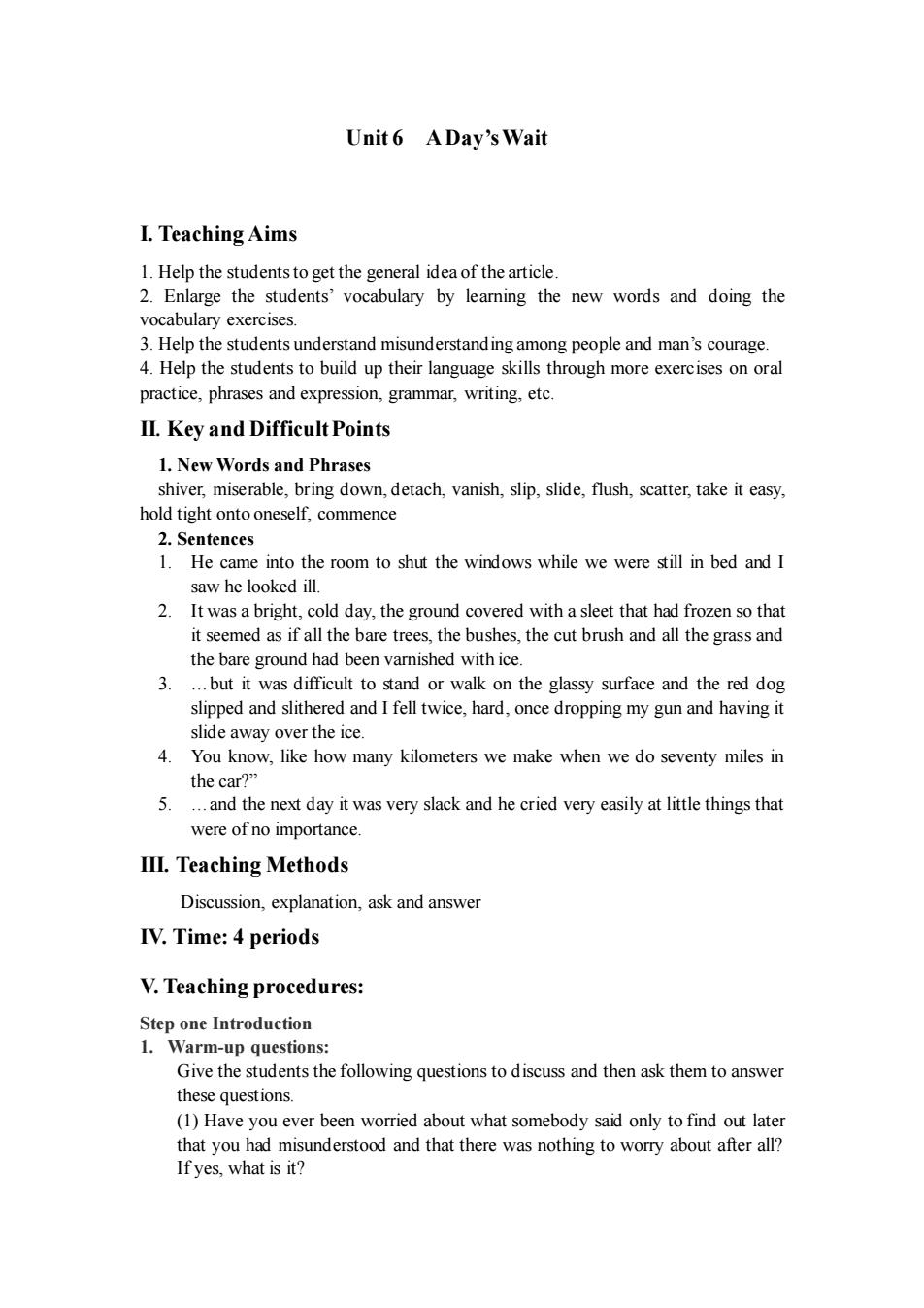
Unit6 ADay's Wait I.Teaching Aims 1.Help the studentsto get the g eneral idea of the article 2.Enlarge the students'vocabulary by learning the new words and doing the vocabulary exercises. 3.Help the students understand misunderstanding among people and man's courage. 4.Help the students to build up their language skills through more exercises on oral practice.phrases and expression,grammar,writing.etc. II.Key and Difficult Points 1.New Words and Phrases shiver,miserable,bring down,detach,vanish,slip,slide,flush,scatter,take it easy. hold tight onto oneself.commence 2 S entence 1. He came into the room tos the windows whil we were in bed ard I saw he looked ill. 2.It was a bright,cold day,the ground covered with a sleet that had frozen so that it seemed as if all the bare trees,the bushes,the cut brush and all the grass and the bare ground had been vamished with ice 3. but it was difficult to nd or walk on the glassy surface and the red dog slipped and slithered and I fell twice,hard,once dropping my gun and having it slide away over the ice. 4.You know,like how many kilometers we make when we do seventy miles in the car?" 5. and the next day it was very slack and he cried very easily at little things that were of no importance III.Teaching Methods Discussion,explanation,ask and answer IV.Time:4 periods V.Teaching procedures: Step one Introduction 1.Warm-up questions: Give the students the following questions to discuss and then ask them to answer these questions (1)Have you ever been worried about what somebody said only to find out later that you had misunderstood and that there was nothing to worry about after all? Ifyes,what is it?
Unit 6 A Day’s Wait I. Teaching Aims 1. Help the students to get the general idea of the article. 2. Enlarge the students’ vocabulary by learning the new words and doing the vocabulary exercises. 3. Help the students understand misunderstanding among people and man’s courage. 4. Help the students to build up their language skills through more exercises on oral practice, phrases and expression, grammar, writing, etc. II. Key and Difficult Points 1. New Words and Phrases shiver, miserable, bring down, detach, vanish, slip, slide, flush, scatter, take it easy, hold tight onto oneself, commence 2. Sentences 1. He came into the room to shut the windows while we were still in bed and I saw he looked ill. 2. It was a bright, cold day, the ground covered with a sleet that had frozen so that it seemed as if all the bare trees, the bushes, the cut brush and all the grass and the bare ground had been varnished with ice. 3. …but it was difficult to stand or walk on the glassy surface and the red dog slipped and slithered and I fell twice, hard, once dropping my gun and having it slide away over the ice. 4. You know, like how many kilometers we make when we do seventy miles in the car?” 5. …and the next day it was very slack and he cried very easily at little things that were of no importance. III. Teaching Methods Discussion, explanation, ask and answer IV. Time: 4 periods V. Teaching procedures: Step one Introduction 1. Warm-up questions: Give the students the following questions to discuss and then ask them to answer these questions. (1) Have you ever been worried about what somebody said only to find out later that you had misunderstood and that there was nothing to worry about after all? If yes, what is it?
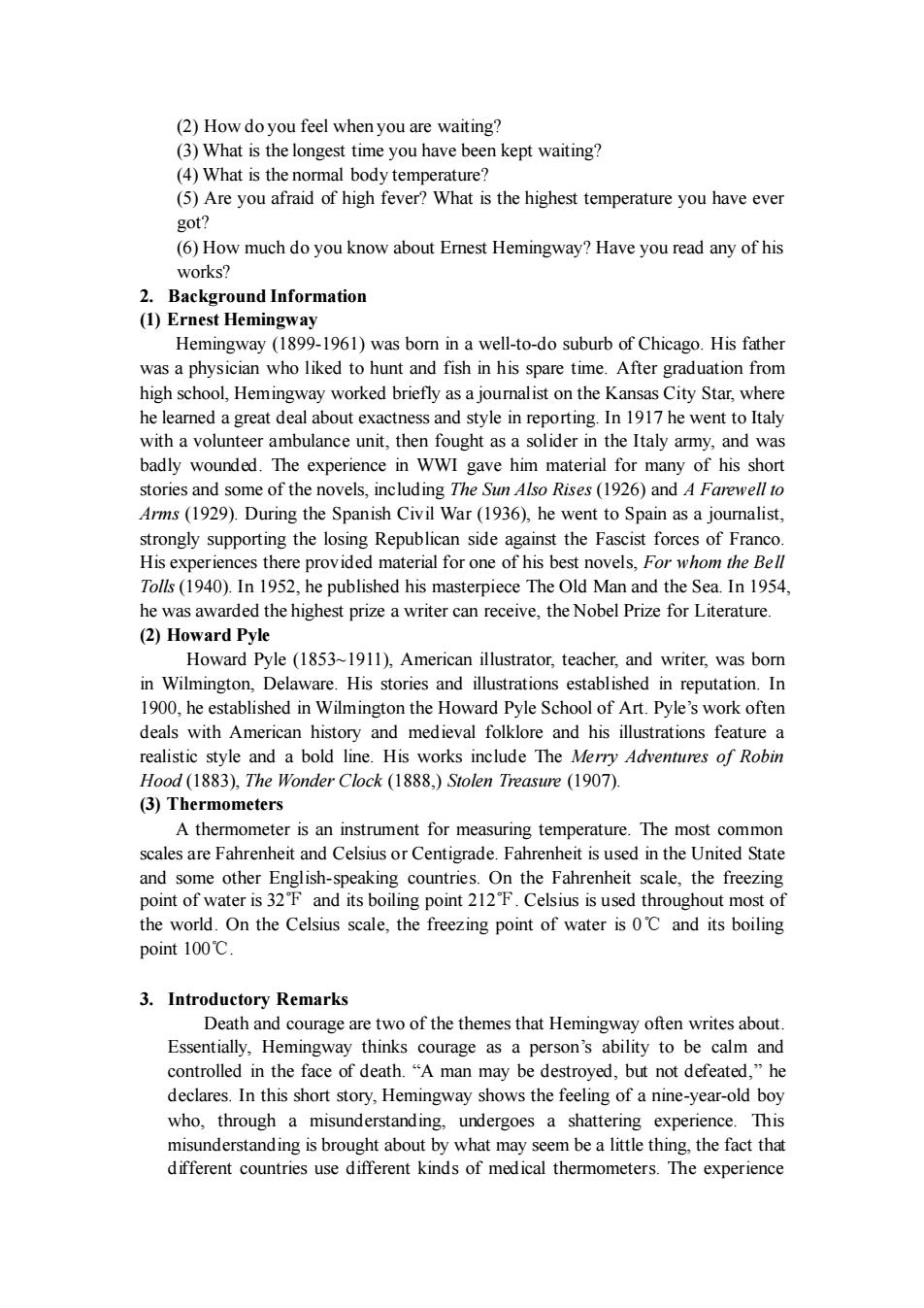
en kept waiting? (4)What is the normal body temperature? (5)Are you afraid of high fever?What is the highest temperature you have ever got? (6)How much do you know about Emest Hemingway?Have you read any of his works? 2.Background Information (1)Ernest Hemingway Hemingway (1899-1961)was bomn in a well-to-do suburb of Chicago.His father was a physician who liked to hunt and fish in his spare time.After graduation from high sch l.Hemin vay worked briefly asa jo aliston the Kans sas City Star,where d a great deal about exactness and style in reporting.In 1917he went to Italy with a volunteer ambulance unit,then fought as a solider in the Italy army,and was badly wounded.The experience in WWI gave him material for many of his short stories and some of the novels,including The Sun Also Rises(1926)and A Farewell to Arms (1929).During the Spanish Civil War(1936),he went to Spain as a joumnalist, ongly supporting the losing Repub n side ag nst the Fas cist orce ranc His experiences there provided material for one of his best novels,For whom the Be Tolls(1940).In 1952,he published his masterpiece The Old Man and the Sea.In 1954 he was awarded the highest prize a writer can receive,the Nobel Prize for Literature. (2)HowardPyle Howard Pyle(1853~1911).American illustrator,teacher,and writer,was bom in Wilmington,Delaware His stories and illustrations established in reputation.In 1900.he established in Wilmington the Howard Pyle School of Art.Pyle's work often deals with American history and medieval folklore and his illustrations feature a realistic style and a bold line.His works include The Merrv Adventures of Robin Hood (1883).The Wonder Clock(1888.)Stolen Treasure(1907). (3)Thermometers A thermometer is an instrument for measuring temperature.The most common scales are Fahrenheit and Celsius or Centigrade.Fahrenheit is used in the United State and some other English-speaking countries.On the Fahrenheit scale,the freezing point of water is 32F and its boiling point 212F.Celsius is used throughout most of the world.On the Celsius scale,the freezing point of water is 0'C and its boiling point 100C 3.Introductory Remarks Death and courage are two of the themes that Hemingway often writes about. Essentially.Hem n's to be and 59 r ability controlled in the face of death."A man nay be declares.In this short story,Hemingway shows the feeling of a nine-year-old boy who,through a misunderstanding.undergoes a shattering experience.This misunderstanding is brought about by what may seem be a little thing,the fact that different countries use different kinds of medical thermometers.The experience
(2) How do you feel when you are waiting? (3) What is the longest time you have been kept waiting? (4) What is the normal body temperature? (5) Are you afraid of high fever? What is the highest temperature you have ever got? (6) How much do you know about Ernest Hemingway? Have you read any of his works? 2. Background Information (1) Ernest Hemingway Hemingway (1899-1961) was born in a well-to-do suburb of Chicago. His father was a physician who liked to hunt and fish in his spare time. After graduation from high school, Hemingway worked briefly as a journalist on the Kansas City Star, where he learned a great deal about exactness and style in reporting. In 1917 he went to Italy with a volunteer ambulance unit, then fought as a solider in the Italy army, and was badly wounded. The experience in WWI gave him material for many of his short stories and some of the novels, including The Sun Also Rises (1926) and A Farewell to Arms (1929). During the Spanish Civil War (1936), he went to Spain as a journalist, strongly supporting the losing Republican side against the Fascist forces of Franco. His experiences there provided material for one of his best novels, For whom the Bell Tolls (1940). In 1952, he published his masterpiece The Old Man and the Sea. In 1954, he was awarded the highest prize a writer can receive, the Nobel Prize for Literature. (2) Howard Pyle Howard Pyle (1853~1911), American illustrator, teacher, and writer, was born in Wilmington, Delaware. His stories and illustrations established in reputation. In 1900, he established in Wilmington the Howard Pyle School of Art. Pyle’s work often deals with American history and medieval folklore and his illustrations feature a realistic style and a bold line. His works include The Merry Adventures of Robin Hood (1883), The Wonder Clock (1888,) Stolen Treasure (1907). (3) Thermometers A thermometer is an instrument for measuring temperature. The most common scales are Fahrenheit and Celsius or Centigrade. Fahrenheit is used in the United State and some other English-speaking countries. On the Fahrenheit scale, the freezing point of water is 32℉ and its boiling point 212℉. Celsius is used throughout most of the world. On the Celsius scale, the freezing point of water is 0℃ and its boiling point 100℃. 3. Introductory Remarks Death and courage are two of the themes that Hemingway often writes about. Essentially, Hemingway thinks courage as a person’s ability to be calm and controlled in the face of death. “A man may be destroyed, but not defeated,” he declares. In this short story, Hemingway shows the feeling of a nine-year-old boy who, through a misunderstanding, undergoes a shattering experience. This misunderstanding is brought about by what may seem be a little thing, the fact that different countries use different kinds of medical thermometers. The experience
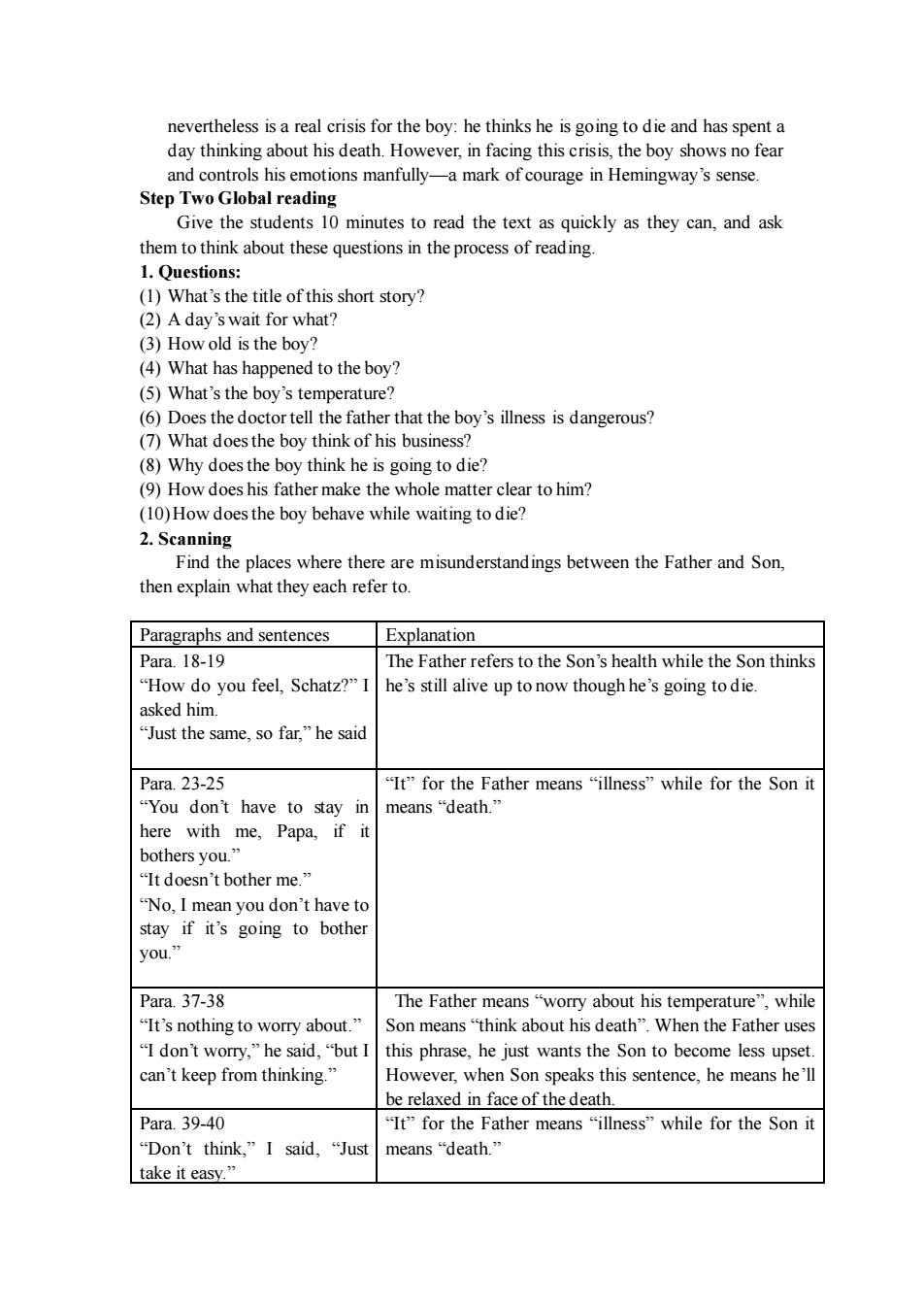
nevertheless is a real crisis for the boy:he thinks he is going to die and has spent a day thinking about his death.Ho wever,in facing this cris ,the boy shows no fear and control Step Two Global reading Give the students 10 minutes to read the text as quickly as they can,and ask them to think about these questions in the process of reading. (1)What's the title of this short story? (2)A day's wait for what' (3)How old is the boy? (4)What has happened to the boy? (5)What's the boy's temperature? tortell the fat r that the boy's illness is dangerous? (8)Why doesthe boy think he is going to die? (9)How does his father make the whole matter clear to him? (10)How does the boy behave while waiting to die? 2.Scanning Find the places where there are misunderstandings between the Father and Son, then explain what they each refer to. Paragraphs and sentences Explanation Para.18-19 The Father refers to the Son's health while the Son thinks "How do you feel,Schatz?"I he's still alive up to now though he's going to die asked him. “Just the same,so far,.”hesaid Para.23-25 r”for the Father means“illness'”while for the Son it "You don't have to stay in means"death." here with me,Papa,if it bothers you." "It doesn't bother me." No I mean you don't have to stay if it's going to bothe you." Para.37-38 The Father means"worry about his temperature",while "It's nothing to worry about." Son means"think about his death"When the father use "dont worry,"he said,"but his phrase,he just wants the Son to become less upse can't keep from thinking." However,when Son speaks this sentence,he means he'll be relaxed in face of the death. Para.39-40 "It"for the Father means"illness"while for the Son it Don't think,”I said,.“Jus ans death.” take it easy
nevertheless is a real crisis for the boy: he thinks he is going to die and has spent a day thinking about his death. However, in facing this crisis, the boy shows no fear and controls his emotions manfully—a mark of courage in Hemingway’s sense. Step Two Global reading Give the students 10 minutes to read the text as quickly as they can, and ask them to think about these questions in the process of reading. 1. Questions: (1) What’s the title of this short story? (2) A day’s wait for what? (3) How old is the boy? (4) What has happened to the boy? (5) What’s the boy’s temperature? (6) Does the doctor tell the father that the boy’s illness is dangerous? (7) What does the boy think of his business? (8) Why does the boy think he is going to die? (9) How does his father make the whole matter clear to him? (10)How doesthe boy behave while waiting to die? 2. Scanning Find the places where there are misunderstandings between the Father and Son, then explain what they each refer to. Paragraphs and sentences Explanation Para. 18-19 “How do you feel, Schatz?” I asked him. “Just the same, so far,” he said The Father refers to the Son’s health while the Son thinks he’s still alive up to now though he’s going to die. Para. 23-25 “You don’t have to stay in here with me, Papa, if it bothers you.” “It doesn’t bother me.” “No, I mean you don’t have to stay if it’s going to bother you.” “It” for the Father means “illness” while for the Son it means “death.” Para. 37-38 “It’s nothing to worry about.” “I don’t worry,” he said, “but I can’t keep from thinking.” The Father means “worry about his temperature”, while Son means “think about his death”. When the Father uses this phrase, he just wants the Son to become less upset. However, when Son speaks this sentence, he means he’ll be relaxed in face of the death. Para. 39-40 “Don’t think,” I said, “Just take it easy.” “It” for the Father means “illness” while for the Son it means “death
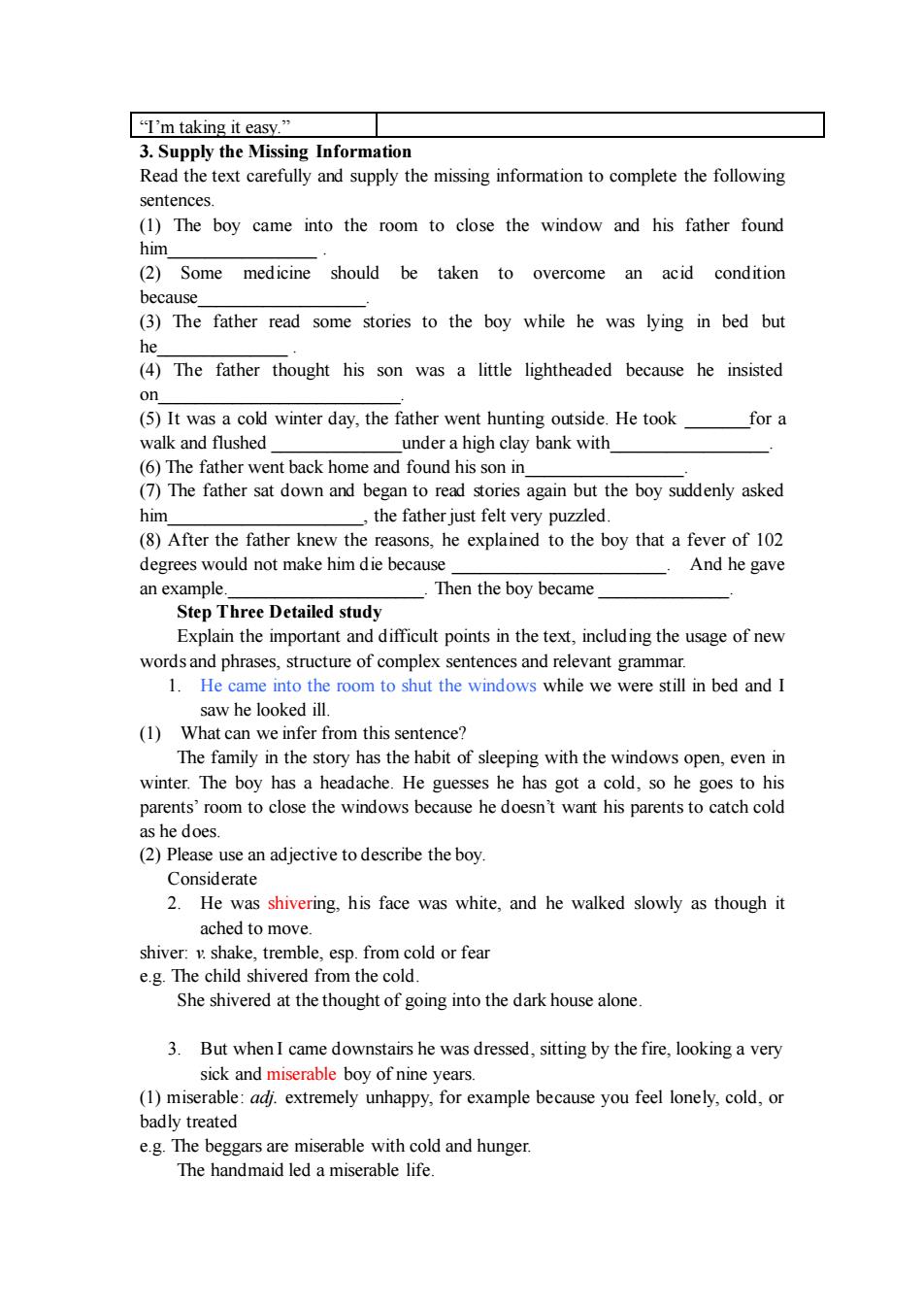
I'm taking it easy.” 3.Supply the Missing Information Read the text carefully and supply the missing information to complete the following sentences. (1)The boy came into the room to close the window and his father found (2)Some medicine should be taken to overcome an acid condition because (3)The father read some stories to the boy while he was lying in bed but he (4)The father thought his son was a little lightheaded because he insisted (5)It was a cold winter day,the father went hunting outside.He took for a walk and flushed」 _under a high clay bank with (6)The father went back home and found his son in (7)The father sat down and began to read stories again but the boy suddenly asked the father just felt very puz (8)After the father knew the reasons,he explained to the boy that a fever of 102 degrees would not make him die because And he gave an example. Then the boy became Step Three Detailed study Explain the important and difficult points in the text,including the usage of new wordsand phrases,structure of complex sentences and relevant gramma 1.He came into the room to shut the windows while we were still in bed and I saw he looked ill. (1)What can we infer from this sentence? The family in the story has the habit of sleeping with the windows open,even in winter.The boy has a headache.He guesses he has got a cold,so he goes to his parents'room to close the windows because he doesn't want his parents to catch cold as he does. (2)Please use an adjective to describe the boy. Considerate 2.He was shivering.his face was white,and he walked slowly as though it ached to move shiver:v.shake,tremble,esp.from cold or fear e.g.The child shivered from the cold. She shivered at the thought of going into the dark house alone 3.But whenI came downstairs he was dressed,sitting by the fire,looking a very sick and miserable boy of nine years. (1)miserable:adj.extremely unhappy,for example because you feel lonely,cold,or badly treated e.g.The beggars are miserable with cold and hunger The handmaid led a miserable life
“I’m taking it easy.” 3. Supply the Missing Information Read the text carefully and supply the missing information to complete the following sentences. (1) The boy came into the room to close the window and his father found him________________ . (2) Some medicine should be taken to overcome an acid condition because__________________. (3) The father read some stories to the boy while he was lying in bed but he______________ . (4) The father thought his son was a little lightheaded because he insisted on__________________________. (5) It was a cold winter day, the father went hunting outside. He took _______for a walk and flushed ______________under a high clay bank with_________________. (6) The father went back home and found his son in_________________. (7) The father sat down and began to read stories again but the boy suddenly asked him_____________________, the father just felt very puzzled. (8) After the father knew the reasons, he explained to the boy that a fever of 102 degrees would not make him die because _______________________. And he gave an example._____________________. Then the boy became ______________. Step Three Detailed study Explain the important and difficult points in the text, including the usage of new words and phrases, structure of complex sentences and relevant grammar. 1. He came into the room to shut the windows while we were still in bed and I saw he looked ill. (1) What can we infer from this sentence? The family in the story has the habit of sleeping with the windows open, even in winter. The boy has a headache. He guesses he has got a cold, so he goes to his parents’ room to close the windows because he doesn’t want his parents to catch cold as he does. (2) Please use an adjective to describe the boy. Considerate 2. He was shivering, his face was white, and he walked slowly as though it ached to move. shiver: v.shake, tremble, esp. from cold or fear e.g. The child shivered from the cold. She shivered at the thought of going into the dark house alone. 3. But when I came downstairs he was dressed, sitting by the fire, looking a very sick and miserable boy of nine years. (1) miserable: adj. extremely unhappy, for example because you feel lonely, cold, or badly treated e.g. The beggars are miserable with cold and hunger. The handmaid led a miserable life
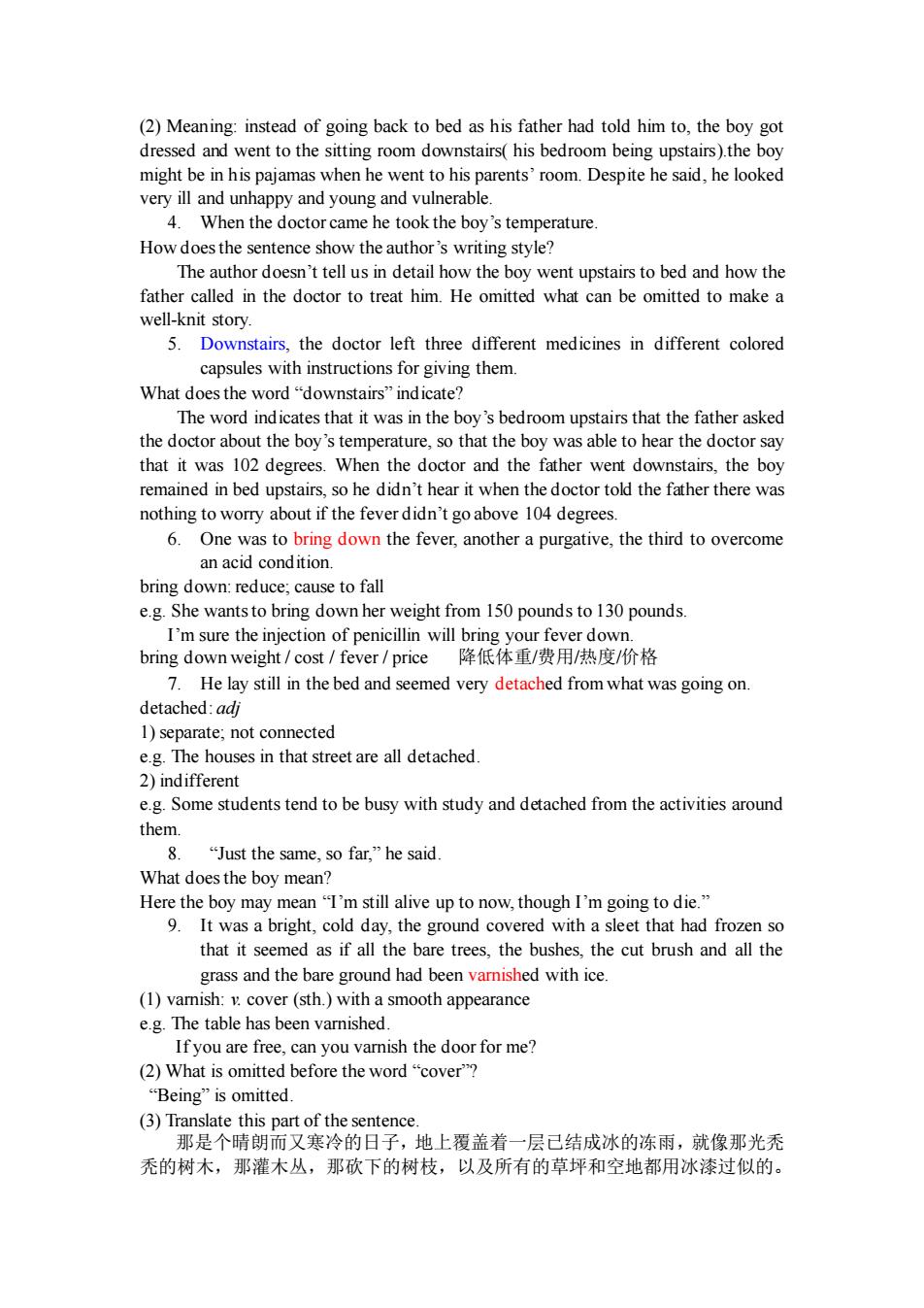
(2)Meaning:instead of going back to bed as his father had told him to,the boy got entto the downstairs(his bedro m be s)the might be in his pajamas when he went to his parents'room.Despite he said,he looked very ill and unhappy and young and vulnerable. 4.When the doctor came he took the boy's temperature How does the sentence show the author's writing style? The author doesn't tell us in detail how the b went upstairs to bed and how the e doctor to treat him.He omitted what can be omitted to make a well-knit story. 5.Downstairs.the doctor left three different medicines in different colored capsules with instructions for giving them What does the word“downstairs”indicate? The word indica es that it was in the boys bedroom upstairs tha at the father asked the doctor about the boy's temperature,so that the boy was able to hear the doctor say that it was 102 degrees.When the doctor and the father went downstairs,the boy remained in bed upstairs,so he didn't hear it when the doctor told the father there was nothing to worry about if the feverdidn't goabove 104 degrees. 6. One S to ng down the fever,another a purgative,the third to overcome an acid conditio bring down:reduce;cause to fall e.g.She wants to bring down her weight from 150 pounds to 130 pounds. I'm sure the injection of penicillin will bring your fever down. bring down weight/.cost/fever/price降低体重/费用/热度/价格 He lay still in the bed and seemed very detached from what was going on detached:adj 1)separate;not connected e.g.The houses in that street are all detached 2)indifferent e.g.Some students tend to be busy with study and detached from the activities around them 8 "Just the same,so far,"he said. What does the boy mean? Here the boy may mean"I'm still alive up to now.though I'm going to die 0 It was a bright,cold day,the ground covered with a sleet that had frozen so that it seer as if all the bare trees the bushes,the cut brush and all the grass and the bare ground had been varnished with ice. (1)varnish:v.cover (sth.)with a smooth appearance e.g.The table has been varnished. (2)What is om the word "cover Being”is omitted (3)Translate this part of the sentence. 邦是个晴朗而又寒冷的日子,地上覆盖着一层已结成冰的冻雨,就像那光秃 秃的树木,那灌木丛,那砍下的树枝,以及所有的草坪和空地都用冰漆过似的
(2) Meaning: instead of going back to bed as his father had told him to, the boy got dressed and went to the sitting room downstairs( his bedroom being upstairs).the boy might be in his pajamas when he went to his parents’ room. Despite he said, he looked very ill and unhappy and young and vulnerable. 4. When the doctor came he took the boy’s temperature. How does the sentence show the author’s writing style? The author doesn’t tell us in detail how the boy went upstairs to bed and how the father called in the doctor to treat him. He omitted what can be omitted to make a well-knit story. 5. Downstairs, the doctor left three different medicines in different colored capsules with instructions for giving them. What does the word “downstairs” indicate? The word indicates that it was in the boy’s bedroom upstairs that the father asked the doctor about the boy’s temperature, so that the boy was able to hear the doctor say that it was 102 degrees. When the doctor and the father went downstairs, the boy remained in bed upstairs, so he didn’t hear it when the doctor told the father there was nothing to worry about if the fever didn’t go above 104 degrees. 6. One was to bring down the fever, another a purgative, the third to overcome an acid condition. bring down: reduce; cause to fall e.g. She wants to bring down her weight from 150 pounds to 130 pounds. I’m sure the injection of penicillin will bring your fever down. bring down weight / cost / fever / price 降低体重/费用/热度/价格 7. He lay still in the bed and seemed very detached from what was going on. detached: adj 1) separate; not connected e.g. The houses in that street are all detached. 2) indifferent e.g. Some students tend to be busy with study and detached from the activities around them. 8. “Just the same, so far,” he said. What does the boy mean? Here the boy may mean “I’m still alive up to now, though I’m going to die.” 9. It was a bright, cold day, the ground covered with a sleet that had frozen so that it seemed as if all the bare trees, the bushes, the cut brush and all the grass and the bare ground had been varnished with ice. (1) varnish: v. cover (sth.) with a smooth appearance e.g. The table has been varnished. If you are free, can you varnish the door for me? (2) What is omitted before the word “cover”? “Being” is omitted. (3) Translate this part of the sentence. 那是个晴朗而又寒冷的日子,地上覆盖着一层已结成冰的冻雨,就像那光秃 秃的树木,那灌木丛,那砍下的树枝,以及所有的草坪和空地都用冰漆过似的